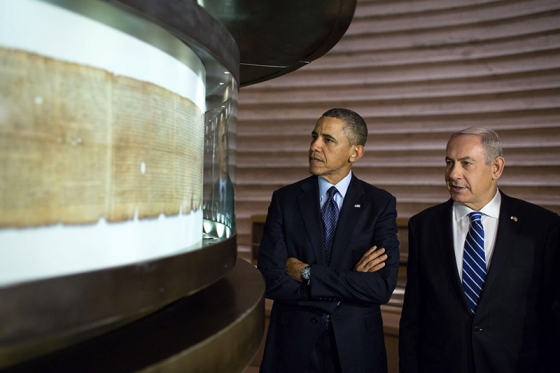There is a silver lining in President Barack Obama’s refusal to do much of anything to end the Israeli-Palestinian conflict. It is this: if Obama had any intentions of either bombing Iran’s nuclear installations or allowing Israel to do it, he would be laying the groundwork by pressuring Israel hard to end the occupation.
That is what President George W. Bush did before he led the invasion of Iraq in 2003. Knowing that attacking Iraq would be viewed as an attack on the Arab world at large, he sought inoculation by suddenly announcing his support for a Palestinian state along with a pledge to end the occupation of Palestinian lands. Calling for an end to the occupation would also help win support from the allies, most notably British Prime Minister Tony Blair.
| There is a silver lining in Obama’s refusal to do anything to end Israeli-Palestinian conflict. |
In March 2002, Bush announced that he intended to devote his energy to achieving the goal of “two states, Israel and Palestine, living side by side, in peace and security.”
This was the first time Bush had endorsed a Palestinian state, and the plan he announced to achieve it (dubbed the “Roadmap To Peace“) was a dramatic break from Bush’s previous cold indifference to Palestinian grievances. Bush went so far as to say that “Israeli settlement activity in occupied territories must stop. And the occupation must end through withdrawal to secure and recognize boundaries consistent with United Nations Resolutions 242 and 338.”
Although only words, Bush’s pledge helped entice Blair into what became his full partnership with Bush in the attack on Iraq and also helped placate some opinion leaders (most notably, American liberal hawks) by suggesting that the Iraq war might indeed lead to a new Middle East. It also alleviated the suspicion in some quarters that the United States was going to war with Iraq for Israel’s sake. Surely a president who vowed to end the occupation was no Israeli tool.
And so Bush invaded, with Blair at his side. Bush’s peace plan, needless to say, went nowhere, exactly where it was probably intended to go. It did however serve Bush’s purpose: his push for peace helped provide the cover to go to war.
Barack Obama’s strategy is nearly the opposite. Not intending to go to war in Iran (a war Israel has been pushing for years), Obama avoids any suggestion that the occupation must end. Sure, Secretary of State John Kerry has both been dispatched to the region and is talking up the necessity for peace. But few take his effort seriously, largely because he emphasizes economic initiatives (fine with Israel) rather than ending settlements and the occupation. The administration remains very careful not to make Israel and its supporters in the U.S. angry.
Obama is storing up capital for when he makes Israel very angry indeed. He is not going to war over Iran’s nuclear development. He will allow Congress to pile on sanctions and he will talk about keeping “all options” on the table but he is not going to war, either directly or by allowing Israel to drag him in. No, despite all the protestations about not relying on “containment” to deter Iran if it develops nuclear weapons, that is exactly what he intends to do. It works with every other nuclear power. It will work with Iran too.
| But the Palestinians can expect no help. |
Of course, any hints that Obama is going the containment route would cause Benjamin Netanyahu and his proxies here to go ballistic, so there are none—only the absence of the hysterical rhetoric about imminent threat that tends to precede any war and certainly preceded the invasion of Iraq.
And that is why Obama is not going to take any significant action to end the occupation. It is why pressure on Israel is out of the question, let alone linking U.S. aid to Israel to its changing its behavior toward the Palestinians. Obama is in the appeasement business: he will appease Israel and its lobby to keep them quiet on Iran. He will not give them the war they want, a war Obama knows would be absolutely catastrophic for U.S. interests (and, in fact, for Israel’s as well).
And so the Palestinians can expect no help from this quarter. Of course, Obama probably wouldn’t be leaning on the Israelis anyway. In the America of the permanent campaign, he is no more free of the need to placate AIPAC-affiliated donors today than he was before his re-election. His political strategists are always there to remind him just how much he needs those donors. But now, knowing that he will not give Netanyahu the one thing he wants above all else, they are certainly telling him to just forget about the occupation. And he is thinking: yes, I have bigger fish to fry.
The Palestinians are, as usual, on their own.
M.J. Rosenberg is a Special Correspondent for The Washington Spectator. He was most recently a Foreign Policy fellow at Media Matters For America. Previously, he spent 15 years as a Senate and House aide. Early in his career he was editor of AIPAC’s newsletter Near East Report. From 1998-2009, he was director of policy at Israel Policy Forum. Follow him @MJayRosenberg and @WashSpec. (Image source: Times of Israel.)







0 Comments